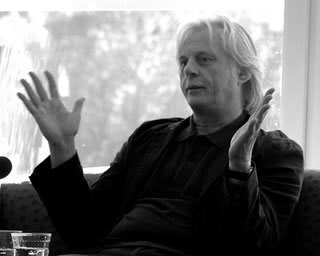Manfred Eicher
 Three
questions to Manfred Eicher
Three
questions to Manfred Eicher ![]()
Last
Saturday in the X Estoril Film Festival, was the second time I had the
opportunity to question Manfred Eicher, the
charismatic founder of ECM. The first happened in 1993 at the launch of
the Jan Garbarek’s Twelve Moons, the ECM 1500
record.
As some knows, by that time I was working as a promoter of the Portuguese distributor
of ECM, Dargil, and as such I went to Zurich to the meeting of developers, distributors
and journalists sponsored by the ECM. Before the short concert with Jan Garbarek,
Manfred Eicher answered to some questions from the audience.
This
second time happened last Saturday, at the end of the projection of Sounds
and Silence by Peter Guyer & Norbert Wiedmer, about the ECM.
I must confess that Manfred Eicher's responses are always something frustrating,
and I don’t only speak of my questions. I think they are always too vague
and evasive. But Manfred Eicher is an old fox that will never be caught.
A friend told me that some of my questions should not have been done, as they
are nothing but personal considerations, and will never be answered. Maybe he
is right. Anyway they were made and here they are.
As
a footnote, concerning Sounds and Silence, though clearly well filmed and
having
many moments of interest, lacked unity that would allow him to live
independently as a film subject, and ultimately proves to be a (poor) object
of advertisement. Still, for lovers and connoisseurs of ECM, the movie has,
as I said, many moments of interest.
Question 1 (Zurich,
1993): The ECM has an extensive and varied catalog. It
also has some characteristics that are associated to you, as charisma, accuracy
and perfection, which forms the ECM as a very personalized label. As far as
we know, all decisions, including what to record or not, belong to you. The
ECM catalog includes Jan Garbarek, Keith Jarrett, Egberto Gismonti and Ralph
Towner, but also Wadada Leo Smith, Hal Russell NRG, Art Ensemble of Chicago,
Terje Rypdal and even Steve Reich, Messiaen, Giya Kancheli, Meredith Monk and
various interpreters play Bach or Shostakovich: ie, includes jazz, fusion and
mainstream, but also free-jazz, classical and contemporary music.
The question for you is simple: do you like all the things you edit or what
are your criteria to choose what to record?
Manfred Eicher: For me, this is not a matter of what I like or dislike. My decisions are based mainly on what I consider deserving or not deserving to be recorded. My criteria are not criteria of taste, and taste no matters to decide whether a disc should or should not be recorded. And public taste does not affect my decision. Just the music does.
Question 2 (Estoril
2010): In the early twentieth century, the recordings were intended to preserve
a moment to the posterity and give it to the public. They
were recordings of music played alive and the audience could imagine it being
played. Throughout the twentieth century, most of the recordings went to
the studio, causing a new relationship between the audience and the recording.
With ECM, I believe that the relationship between the musician, the act of
recording and the disk was lost definitively, as if the object could live
without
the original moment of the recording. As we saw in the movie (Sounds and
Silence), you interfere with the recording in the minimum detail, and each
ECM disc seems
to have both of you and the musician, and he became a living object for itself.
And it is a cult object, by the music, but also by its cover and the smallest
details of production.
The public no longer imagine the musicians playing, and somehow it is as
if the moment of creation was the disc and the recording never even happened.
The question for you is: when you start a recording, your intention is to
preserve a moment and a music for the eternity or just create a new musical
object?
Manfred Eicher: I'm not really concerned about preserving a moment for eternity,
but just do what I know best which is to offer the musician the best possible
conditions so that he can realize his ideas. I try to create an empathy with
the musician, to hear him and understand his ideas. And I think that is what
makes the difference, because the musician must have someone to trust. And
this is what I consider my greatest contribution to music: to hear the musician
and offer him the best conditions to record his creation, offer him the best
possible sound for his creation. And I try to do it as best as possible,
with the best sound possible, balancing the sound, trying to understand what
the
musician intended, highlighting another instrument or sound, often as the
musician can not do because he knows how to play or compose but writing is
what I do.
I'm not thinking of the public, but if we succeed, then that's good for the
musician and music and I can say that I was also successful.
But the album is not done with the pretense of being something special rather
than being a reflection of a good composition and good performance. And in
the end is always the public who decides.
|
photo_by_Marek_Vogel
|
Question 3 (Estoril 2010): What do you think about the industry crisis, how does the ECM sees its future and what is it doing to face it?
Manfred Eicher: I think
we should not regret too much and not listen to the pessimists who are only
able to see the negative things everywhere.
I try
not to think about it and concentrate purely on what I do. And after
all I really
do not feel myself as a part of the industry and I will continue to do
just what I do the best until I can do it.
http://www.ecmrecords.com/